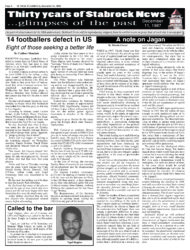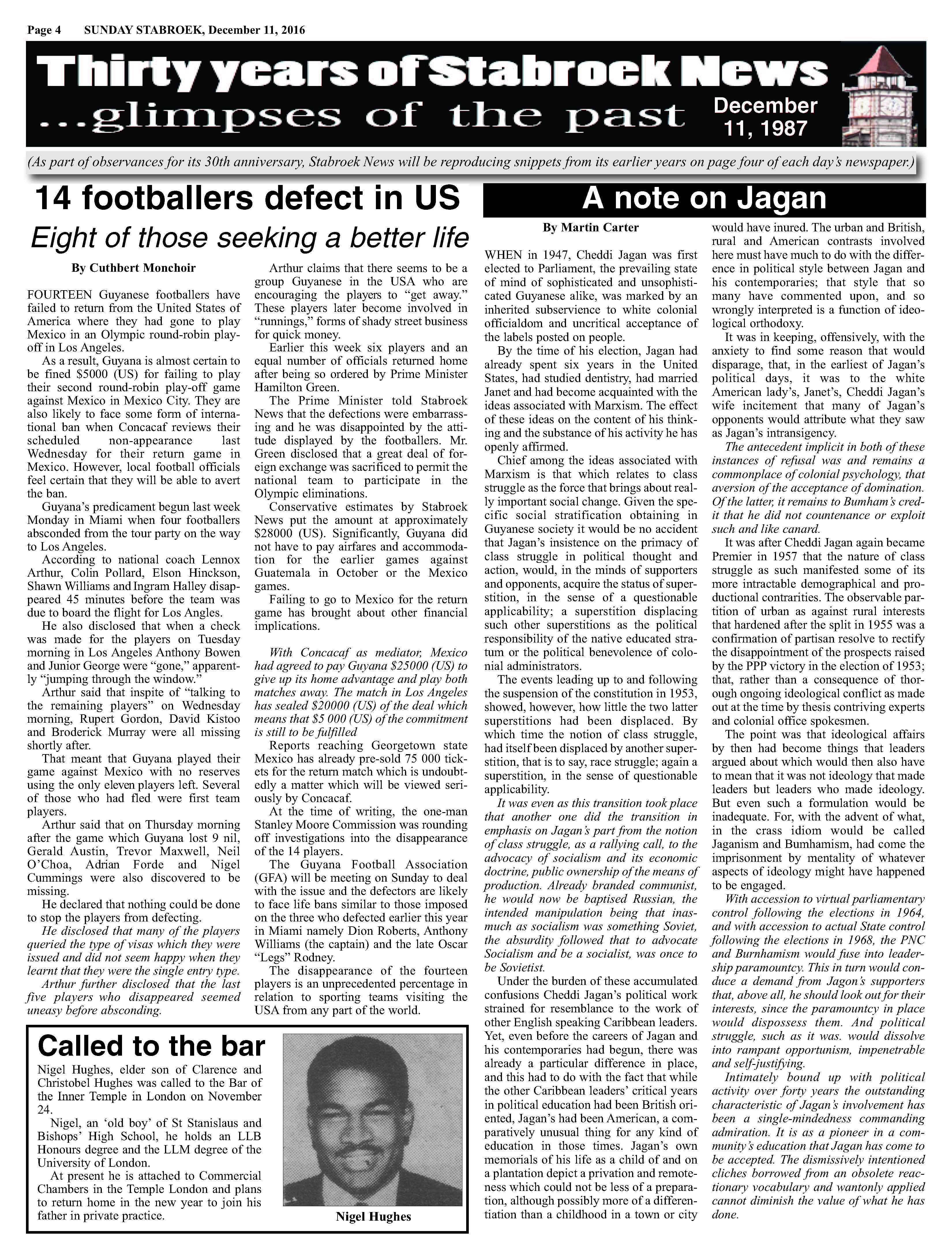By Cuthbert Monchoir
FOURTEEN Guyanese footballers have failed to return from the United States of America where they had gone to play Mexico in an Olympic round-robin play-off in Los Angeles.
As a result, Guyana is almost certain to be fined $5000 (US) for failing to play their second round-robin play-off game against Mexico in Mexico City. They are also likely to face some form of international ban when Concacaf reviews their scheduled non-appearance last Wednesday for their return game in Mexico. However, local football officials feel certain that they will be able to avert the ban.
Guyana’s predicament begun last week Monday in Miami when four footballers absconded from the tour party on the way to Los Angeles.
 According to national coach Lennox Arthur, Colin Pollard, Elson Hinckson, Shawn Williams and Ingram Halley disappeared 45 minutes before the team was due to board the flight for Los Angles.
According to national coach Lennox Arthur, Colin Pollard, Elson Hinckson, Shawn Williams and Ingram Halley disappeared 45 minutes before the team was due to board the flight for Los Angles.
He also disclosed that when a check was made for the players on Tuesday morning in Los Angeles Anthony Bowen and Junior George were “gone,” apparently “jumping through the window.”
Arthur said that inspite of “talking to the remaining players” on Wednesday morning, Rupert Gordon, David Kistoo and Broderick Murray were all missing shortly after.
That meant that Guyana played their game against Mexico with no reserves using the only eleven players left. Several of those who had fled were first team players.
Arthur said that on Thursday morning after the game which Guyana lost 9 nil, Gerald Austin, Trevor Maxwell, Neil O’Choa, Adrian Forde and Nigel Cummings were also discovered to be missing.
He declared that nothing could be done to stop the players from defecting.
He disclosed that many of the players queried the type of visas which they were issued and did not seem happy when they learnt that they were the single entry type.
Arthur further disclosed that the last five players who disappeared seemed uneasy before absconding.
Arthur claims that there seems to be a group Guyanese in the USA who are encouraging the players to “get away.” These players later become involved in “runnings,” forms of shady street business for quick money.
Earlier this week six players and an equal number of officials returned home after being so ordered by Prime Minister Hamilton Green.
The Prime Minister told Stabroek News that the defections were embarrassing and he was disappointed by the attitude displayed by the footballers. Mr. Green disclosed that a great deal of foreign exchange was sacrificed to permit the national team to participate in the Olympic eliminations.
Conservative estimates by Stabroek News put the amount at approximately $28000 (US). Significantly, Guyana did not have to pay airfares and accommodation for the earlier games against Guatemala in October or the Mexico games.
Failing to go to Mexico for the return game has brought about other financial implications.
With Concacaf as mediator, Mexico had agreed to pay Guyana $25000 (US) to give up its home advantage and play both matches away. The match in Los Angeles has sealed $20000 (US) of the deal which means that $5 000 (US) of the commitment is still to be fulfilled
Reports reaching Georgetown state Mexico has already pre-sold 75 000 tickets for the return match which is undoubtedly a matter which will be viewed seriously by Concacaf.
At the time of writing, the one-man Stanley Moore Commission was rounding off investigations into the disappearance of the 14 players.
The Guyana Football Association (GFA) will be meeting on Sunday to deal with the issue and the defectors are likely to face life bans similar to those imposed on the three who defected earlier this year in Miami namely Dion Roberts, Anthony Williams (the captain) and the late Oscar “Legs” Rodney.
The disappearance of the fourteen players is an unprecedented percentage in relation to sporting teams visiting the USA from any part of the world.
A note on Jagan
By Martin Carter
WHEN in 1947, Cheddi Jagan was first elected to Parliament, the prevailing state of mind of sophisticated and unsophisticated Guyanese alike, was marked by an inherited subservience to white colonial officialdom and uncritical acceptance of the labels posted on people.
By the time of his election, Jagan had already spent six years in the United States, had studied dentistry, had married Janet and had become acquainted with the ideas associated with Marxism. The effect of these ideas on the content of his thinking and the substance of his activity he has openly affirmed.
Chief among the ideas associated with Marxism is that which relates to class struggle as the force that brings about really important social change. Given the specific social stratification obtaining in Guyanese society it would be no accident that Jagan’s insistence on the primacy of class struggle in political thought and action, would, in the minds of supporters and opponents, acquire the status of superstition, in the sense of a questionable applicability; a superstition displacing such other superstitions as the political responsibility of the native educated stratum or the political benevolence of colonial administrators.
The events leading up to and following the suspension of the constitution in 1953, showed, however, how little the two latter superstitions had been displaced. By which time the notion of class struggle, had itself been displaced by another superstition, that is to say, race struggle; again a superstition, in the sense of questionable applicability.
It was even as this transition took place that another one did the transition in emphasis on Jagan’s part from the notion of class struggle, as a rallying call, to the advocacy of socialism and its economic doctrine, public ownership of the means of production. Already branded communist, he would now be baptised Russian, the intended manipulation being that inasmuch as socialism was something Soviet, the absurdity followed that to advocate Socialism and be a socialist, was once to be Sovietist.
Under the burden of these accumulated confusions Cheddi Jagan’s political work strained for resemblance to the work of other English speaking Caribbean leaders. Yet, even before the careers of Jagan and his contemporaries had begun, there was already a particular difference in place, and this had to do with the fact that while the other Caribbean leaders’ critical years in political education had been British oriented, Jagan’s had been American, a comparatively unusual thing for any kind of education in those times.
Jagan’s own memorials of his life as a child of and on a plantation depict a privation and remoteness which could not be less of a preparation, although possibly more of a differentiation than a childhood in a town or city would have inured. The urban and British, rural and American contrasts involved here must have much to do with the difference in political style between Jagan and his contemporaries; that style that so many have commented upon, and so wrongly interpreted is a function of ideological orthodoxy.
It was in keeping, offensively, with the anxiety to find some reason that would disparage, that, in the earliest of Jagan’s political days, it was to the white American lady’s, Janet’s, Cheddi Jagan’s wife incitement that many of Jagan’s opponents would attribute what they saw as Jagan’s intransigency.
The antecedent implicit in both of these instances of refusal was and remains a commonplace of colonial psychology, that aversion of the acceptance of domination. Of the latter, it remains to Bumham’s credit that he did not countenance or exploit such and like canard.
It was after Cheddi Jagan again became Premier in 1957 that the nature of class struggle as such manifested some of its more intractable demographical and productional contrarities. The observable partition of urban as against rural interests that hardened after the split in 1955 was a confirmation of partisan resolve to rectify the disappointment of the prospects raised by the PPP victory in the election of 1953; that, rather than a consequence of thorough ongoing ideological conflict as made out at the time by thesis contriving experts and colonial office spokesmen.
The point was that ideological affairs by then had become things that leaders argued about which would then also have to mean that it was not ideology that made leaders but leaders who made ideology. But even such a formulation would be inadequate. For, with the advent of what, in the crass idiom would be called Jaganism and Bumhamism, had come the imprisonment by mentality of whatever aspects of ideology might have happened to be engaged.
With accession to virtual parliamentary control following the elections in 1964, and with accession to actual State control following the elections in 1968, the PNC and Burnhamism would fuse into leadership paramountcy. This in turn would conduce a demand from Jagon’s supporters that, above all, he should look out for their interests, since the paramountcy in place would dispossess them. And political struggle, such as it was. would dissolve into rampant opportunism, impenetrable and self-justifying.
Intimately bound up with political activity over forty years the outstanding characteristic of Jagan’s involvement has been a single-mindedness commanding admiration. It is as a pioneer in a community’s education that Jagan has come to be accepted. The dismissively intentioned cliches borrowed from an obsolete reactionary vocabulary and wantonly applied cannot diminish the value of what he has done.
Called to the bar
Nigel Hughes, elder son of Clarence and Christobel Hughes was called to the Bar of the Inner Temple in London on November 24.
Nigel, an ‘old boy’ of St Stanislaus and Bishops’ High School, he holds an LLB Honours degree and the LLM degree of the University of London.
At present he is attached to Commercial Chambers in the Temple London and plans to return home in the new year to join his father in private practice.





